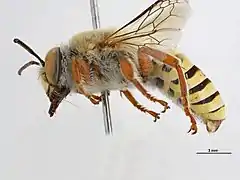Stenotritidae
Stenotritidae es la más pequeña de todas las familias de abejas formalmente reconocidas, con solo 21 especies en dos géneros, todas ellas restringidas a Australia. Históricamente, se consideraba que pertenecían a la familia Colletidae, pero en la actualidad se considera que Stenotritidae es una familia diferente y no una subfamilia.[1] De primordial importancia es que tienen piezas bucales no modificadas, mientras que los colétidos se diferencian de todas las otras abejas por tener una lengua bilobulada.
| Stenotritidae | ||
|---|---|---|
 Ctenocolletes tigris | ||
| Taxonomía | ||
| Reino: | Animalia | |
| Filo: | Arthropoda | |
| Clase: | Insecta | |
| Orden: | Hymenoptera | |
| Suborden: | Apocrita | |
| Superfamilia: | Apoidea | |
| Familia: | Stenotritidae | |
| Géneros | ||
| ||
Son abejas grandes, densamente pilosas, vuelan a gran velocidad y hacen nidos simples en el suelo. Colocan masas de provisiones ovoides en las celdillas. Estas se disponen en hileras y están recubiertas de una secreción impermeable. Las larvas no hilan capullos.
Se han encontrado celdillas de cría fósiles del Pleistoceno en la península de Eyre en el sur de Australia.[2]
Especies
- Ctenocolletes
- Ctenocolletes albomarginatus Michener 1965
- Ctenocolletes centralis Houston, 1983
- Ctenocolletes fulvescens Houston 1983
- Ctenocolletes nicholsoni (Cockerell 1929)
- Ctenocolletes nigricans Houston, 1985
- Ctenocolletes ordensis Michener 1965
- Ctenocolletes rufescens Houston, 1983
- Ctenocolletes smaragdinus (Smith 1868)
- Ctenocolletes tigris Houston, 1983
- Ctenocolletes tricolor Houston, 1983
- Stenotritus
- Stenotritus elegans Smith, 1853
- Stenotritus elegantior Cockerell, 1921
- Stenotritus ferricornis (Cockerell, 1916)
- Stenotritus greavesi (Rayment, 1930)
- Stenotritus murrayensis (Rayment 1935)
- Stenotritus nigrescens (Friese, 1924)
- Stenotritus nitidus (Smith, 1879)
- Stenotritus pubescens (Smith, 1868)
- Stenotritus rufocollaris (Cockerell, 1921)
- Stenotritus splendidus (Rayment, 1930)
- Stenotritus victoriae (Cockerell, 1906)
Referencias
- Danforth, B.N., Sipes, S., Fang, J., Brady, S.G. (2006) The history of early bee diversification based on five genes plus morphology. Proceedings of the National Academy of Sciences 103: 15118-15123.
- Houston, T.F. (1987). «Fossil brood cells of stenotritid bees (Hymenoptera: Apoidea) from the Pleistocene of South Australia». Transactions of the Royal Society of South Australia 3: 93-97.
- C. D. Michener (2000) The Bees of the World, Johns Hopkins University Press.
Brothers D.J. 1999. Phylogeny and evolution of wasps, ants and bees (Hymenoptera, Chrysidoidea, Vespoidea and Apoidea). Zoológica Scripta 28: 233–250.
- Danforth, B.N., Sipes, S., Fang, J., Brady, S.G. (2006) The history of early bee diversification based on five genes plus morphology. Proceedings of the National Academy of Sciences 103: 15118-15123.
- McGinley, R.J. (1980). Glossal morphology of the Colletidae and recognition of the Stenotritidae at the family level. J. Kansas Entomol. Soc. 53:539-552.
- McGinley, R.J. (1981). Systematics of the Colletidae based on mature larvae with phenetic analysis of apoid larvae, Hymenoptera: Apoidea. Univ. Calif. Publ. Entomol. 91:i-xvi, 1-307.
- Michener C. D. 2000. The Bees of the World, Johns Hopkins University Press.
- Esta obra contiene una traducción derivada de «Stenotritidae» de Wikipedia en inglés, publicada por sus editores bajo la Licencia de documentación libre de GNU y la Licencia Creative Commons Atribución-CompartirIgual 4.0 Internacional.